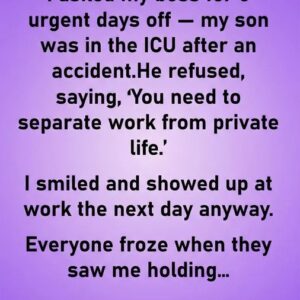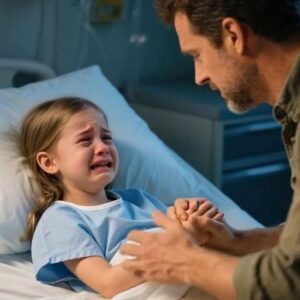Kira was just twelve years old when her life took an unexpected and frightening turn. A quiet girl with big eyes and gentle dreams, she had always been healthy—until one day, her stomach began to swell. At first, her mother brushed it off as a bad stomach bug. Maybe something she ate. But as days passed, the swelling didn’t go away—it got worse. Kira’s pain grew so intense that even sitting up made her cry.
Her once-flat belly became tight and round. Something was clearly wrong.
Her mother, a single parent juggling two cleaning jobs, knew she had no time or money to waste. She gathered what little they had, held Kira’s hand, and took a rickety bus to the nearest hospital—more than an hour away. The ride was filled with silent prayers and stifled fear. Her mother didn’t cry. She couldn’t. Kira needed strength more than sympathy.
At the hospital, the doctors ran tests, poked and scanned, whispered to each other behind clipboards. When the diagnosis came, it stunned everyone: intestinal lymphangiectasia. A rare and serious disorder. Her body was leaking protein and lymphatic fluid into her abdomen. Left untreated, it could be fatal.
The treatment would be long, expensive, and invasive—surgeries, injections, lifelong dietary restrictions. For a struggling family with no health insurance, it felt like an impossible mountain. But Kira never once asked, “Why me?” She smiled through the pain. She thanked the nurses. She even tried to comfort her mother with whispered encouragement at night.
And in her worst moments, when the burning pain in her gut made her legs tremble, Kira closed her eyes and imagined a future where she wasn’t the one in the bed—but the one standing beside it. She didn’t want revenge on pain. She wanted to stop it. That’s when she made a decision: she would become a doctor.
School was merciless. Her condition affected her appearance—she was thin, pale, her face bloated from steroids. Kids weren’t kind. They mocked her, called her names. “Balloon Girl.” “Puffy.” “Alien Face.” She cried in bathroom stalls. But she kept showing up. She studied during hospital stays. Memorized vocabulary while hooked to IVs. Wrote scholarship essays late at night, under a flickering bulb in their cramped one-bedroom apartment.
Her mother never stopped working—cleaning floors, scrubbing toilets, folding linens until her hands cracked. And all of it, every sleepless night and aching joint, was worth it when Kira received a full scholarship to medical school.
That’s where everything changed again.
One icy November evening, the fire alarm blared through the dorms. Most students fled, but Kira heard screaming on the third floor. Smoke filled the halls. A bookshelf had collapsed, trapping another student. Without thinking, Kira rushed into the flames. She dragged the girl out, choking on smoke, powered by pure will.
The incident made local news, but Kira refused interviews. She hadn’t done it for recognition. She did it because someone needed help—and that, to her, was enough.
Years passed. She graduated. She earned her white coat—not with pride, but with purpose.
She didn’t choose the easy path. She took the overnight shifts. The high-risk patients. The cases that scared others. She sat by bedsides, held trembling hands, spoke softly to frightened families. She remembered what it felt like to be on the other side. And that memory made her fierce.
Then, one day, a mother walked into her clinic holding the hand of a young girl whose belly was unnaturally swollen. Her face was pale. Her chart was full of unanswered questions.
Kira listened carefully. She reviewed the symptoms. And then, her heart sank—because she recognized it immediately.
After confirming with tests, she sat gently beside the mother and said, “Your daughter has intestinal lymphangiectasia.”
The woman froze, lips trembling. Before the tears came, Kira leaned in, took her hand, and said, “I had it too. When I was her age. I know this is terrifying. But I promise you—she can get through this. I did.”
The woman broke down in sobs. But Kira didn’t.
Not until weeks later, when a different woman showed up at her office. Someone Kira had treated years ago. This time, she had a little girl by her side.
“I wanted you to meet her,” the woman said, smiling. “Her name is Kira.”
That’s when the tears came.
Not from fear. Not from pain.
From joy.
Because in that moment, Kira understood that survival is not just about staying alive—it’s about becoming something more. She had taken her brokenness, her scars, her suffering—and turned it into a light for others.
She didn’t just survive.
She became someone others could look to when the world felt hopeless.
A guide.
A fighter.
A lighthouse.
And that made all the difference.



